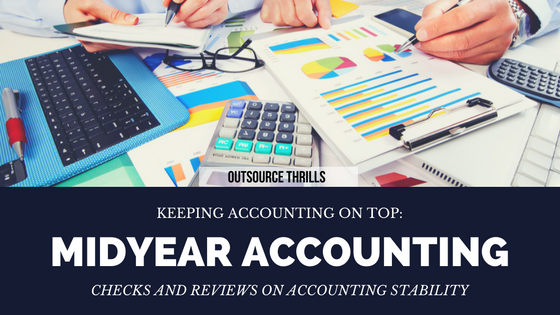Keeping Accounting on Top: Midyear Accounting Checks and Reviews on Accounting Stability
The industry of accounting is one of the steadiest industries in the United States. The revenue it has accumulated in the past years is a reflection of its stability. The revenue of accounting, alongside tax preparation, bookkeeping, and payroll services in the United States reached approximately 137 billion U.S. dollars in 2013. In fact, accounting, tax preparation, bookkeeping, and payroll services lead the market with a net profit margin of 19.8% and remain the most profitable industries in 2015, behind legal services, and oil and gas extraction. A portion of accounting’s profit is thanks to the growing industry of outsourcing. The leading accounting and auditing firms worldwide (Deloitte, Pricewaterhouse Coopers, Ernst & Young and KPMG) alone made around 40 billion U.S. dollars between them in 2013, employing more than 717, 000 people. By 2018, this industry is projected to generate around 160 billion or more.
 |
| Image Source: http://bit.ly/2a1KuiX |
However, being a giant in the market did not excuse accounting from legal cases involving fraud and the like. In a research conducted by Cornerstone Research in 2014 regarding Accounting Class Action Filings and Settlements, the reviews and analyses show that allegations of accounting fraud increased by 47 percent in securities class-action lawsuits in 2014 compared from the data from 2013. This just shows the vulnerability of accounting in the legal aspects.
This is just one of the main reasons why accounting and tax expenditure are closely monitored by the US government in the past decades. In the midyear newsletter of The Federal Accounting Standards Advisory Board or FASAB, they released a follow up in the Risk Assumed—Insurance Programs. The Program Board has approved edits on the terms of Insurance Program, Exclusions, Incurred but Not Reported, Insurance Claim, Insurance Contract, Cash Surrender Value, and Recoveries. Risk Assumed—Insurance Programs objective is to determine the risks the federal government assumes when it implements policy initiatives to provide safety and stabilize financial markets and the economy. It also aims to update the current standards that are limited to insurance contracts and explicit guarantees.
FASAB is a US federal advisory committee which has been established through the Chief Financial Officers Act of 1990 to develop generally accepted accounting principles or GAAP. FASAB serves the public interest by improving federal financial reporting through issuing federal financial accounting standards and providing guidance after considering the needs of external and internal users of federal financial information. The American Institute of CPAs or AICPA Council designated FASAB as the only body that establishes accounting principles for federal entities. FASAB has scheduled meeting regarding Risk Assumed Insurance Programs on the 24th and 25th of August, 19th and 20th of October, and on the 19th and 20th of December.
Various data and research about accounting will prove that it will continue to be a dominating industry for decades to come. And with the FASAB flourishing it up to make it a stable industry with lesser risk, we can count on accounting to stay on top of the market for a very long time.
.png)








0 comments: